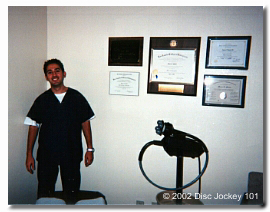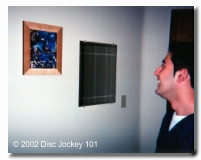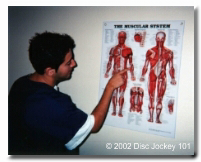DJ Health: Interview with Dr. Majera T. Majidi, D.C., CSCS (aka DJ Maji) Part I
August 2002
Note: This tip became popular with turntablists and scratch DJ's. Dr. Majidi served on the SCC DJ Program Advisory Committee. He offers DJ's a discount.
Disc Jockey 101: When did you decide on a career in the medical profession?
Dr. Majidi: Probably in high school when I was dancing a lot. I got fascinated by what was making this music move the body in certain positions. I got into bio-mechanics. I didn't know anything about chiropractic. But later on, when I was looking for a career in medicine, I realized that chiropractors are doctors of bio-mechanics - like how the body moves.
Disc Jockey 101: What are your medical degrees?
Dr. Majidi: I have a Bachelors in Microbiology and a Doctorate (D.C.), which is a medical degree in Chiropractic. I also have a specialist-fellowship degree in strength and conditioning.
Disc Jockey 101: How long have you been a DJ?
Dr. Majidi: Since 1991.
Disc Jockey 101: What made you get interested in becoming a DJ?
Dr. Majidi: I was involved in hip hop production, and before that, hip hop dance, so I was always worshiping the DJ's. I was making beats for emcees and working with groups like "Supermarket," who now have content that's very sought-after.
Disc Jockey 101: What inspired you to combine your love of spinning with your medical career? In other words, when did you first begin DJ related medical research?
Dr. Majidi: During DJ battles, I would watch the body movements of the competitors and take notes. I would apply what I knew about bio-mechanics to their movements. After the competition, I would approach the DJ's and tell them that I could improve their speed.
Disc Jockey 101: So you can help a DJ scratch faster?
Dr. Majidi: I can help a DJ improve speed and muscle stamina - particularly the length of time a DJ can perform a certain movement without muscle fatigue. Speed is something that I definitely can improve. In some of my patients, I've seen a speed increase of 20 to 25% - such as how fast they can crab or perform a two-click. It's important to stimulate that [muscle] area and focus on it.
Disc Jockey 101: Who are some of your patients?
Dr. Majidi: DJ Radar, who is very conditioned and has amazing speed. The bone structure of these DJ's change from the repeated motion. When I felt Radar's wrists, I said to myself, 'this is ridiculous.' It's not a genetic thing, it's just that he practices so much and he's so conditioned - like any athlete.
Disc Jockey 101: What does some of your DJ medical research reveal?
Dr. Majidi: As far as documented research, there's a fourteen question survey that I distributed in 2000, from which, I got around 100 replies. I didn't make a distinction between scratch DJ's and beat-mix DJ's. Instead, the survey was more about posture and the ergonomics of their booth and performance environment. A sample question would ask whether the DJ felt that the turntables were too high or too low. In the survey, 80% of the time, the DJ's felt that the turntables were too low - regardless of the average height of the DJ - which is about 5 foot 8 inches.
Disc Jockey 101: Then what is the recommended height for a turntable?
Dr. Majidi: Well it really depends on what makes you comfortable. It really should be an inch or inch-and-one-half above your belly button. When you think about it, it seems rather high, but for an optimal level, it should be that high. But again, it will vary by DJ - and his or her humerus bone length and how much elbow flexion to get his or her hand position correct.
Disc Jockey 101: What else did you find?
Dr. Majidi: I wanted to know about their working conditions and whether they had any problems - such as tingling or pain in their hands. Do they get a burning sensation in their forearm? I found that most of the beat-mix DJ's don't have those problems. But a lot of scratch DJ's get fatigue in their forearms. Based on that study - and what's known about carpal tunnel syndrome and DJ's - I want to conduct research on pronator teres syndrome, which is the most common muscle used by scratch DJ's. These DJ's tend to overwork that muscle and it may cause pain in the hand. DJ's like Q-Bert and the other big-name scratch DJ's are often treated for that. Many of these DJ's usually know how to self-treat themselves for this.
Next Month: Part II of the Dr. Majidi interview.
Related Links


From entertainment attorneys who specialize in DJ related law to electronic music software designers - to artists who paint DJ art, innovative careers related to the DJ profession are growing. One person who has combined his love of spinning with a career in the medical profession is Dr. Majera T. Majidi, who is also known as DJ Maji. Dr. Majidi is pioneering a new field of medical research: DJ Health. This is the first part of a two part interview with Dr. Majidi:
Dr. Majidi shows a depiction of the upper limb muscles vital to scratch and battle DJ's
Dr. Majidi shows his painting of a DJ with two turntables



